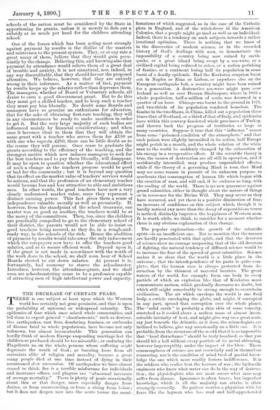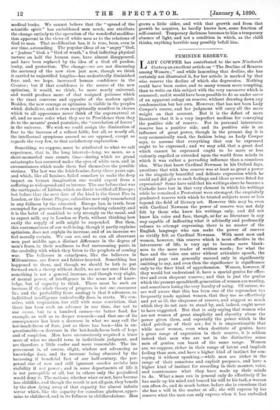TUE DECREASE OF CERTAIN FEARS.
THERE is one subject at least upon which the Western world has certainly not gone pessimist, and that is upon the probability of universal or widespread calamity. The epidemics of fear which once seized whole communities, and led them to expect general " chastisements," such as destruc- tive earthquakes, vast fires, desolating famines, or outbreaks of disease fatal to whole populations, have become not only unknown, but almost inconceivable. This generation can hardly think of modern Europe suspending marriage lest the children so produced should be too miserable; or enduring the Flagellants as, on the whole, persons whose suffering might deprecate the wrath of God ; or bursting loose from all restraints alike of religion and morality, because a great many people died at one time instead of dying in their accustomed slow succession. Of earthquakes we have almost ceased to think, fire is a terrible misfortune for individuals and insurance offices, and plagues are "abnormal increases of average mortality." There is plenty of panic occasionally about this or that danger, more especially danger from drains, or from overcrowding, or from a rising from below ; but it does not deepen now into the acute terror the mani- festations of which suggested, as in the case of the Catholic plots in England, and of the witch-fever iii the American Colonies, that a people might go mad as well as an individual. Indeed, there is a tendency on such subjects towards a rather irrational optimism. There is nothing that we know of in the discoveries of modern science, or in the recorded history of God's dealings with men, to demonstrate the impossibility of a country being now ruined by earth- quake, or a great island being swept by a sea-wave, or a civilised capital being reduced to ashes, or a nation perishing of famine, or a continent losing half its population in some burst of a deadly epidemic. Had the Krakatoa eruption burst out in Naples or Etna or Lisbon, or anywhere else on the European earthquake belt, a country might have been ruined for a generation. A destructive sea-wave might pass over Ireland as well as over Deccan Shabazpore, where in 1866 a whole population, half-a-million of souls, was drowned in a quarter of an hour. Chicago was burnt to the ground in 1871, and two-thirds of its population rendered homeless. The famine in the two Shans, in China, killed out a population three times that of Scotland, or a third of that of Italy, and epidemics have within this century desolated whole provinces of Turkey, and thrown back the progress of territories as large as many countries. Suppose it true that this " influenza " comes from some "poisoned condition of the atmosphere," and that such poison were slightly intensified in its action, half Europe might perish in a month, and the whole relation of the white man to the world be suddenly changed by the exhaustion of his energy in a recuperative effort. If the scientific theory is true, the causes of destruction are all still in operation, and if accidentally intensified, may produce unparalleled effects; while if the theory of a governing Mind is true, that Mind may see some reason in pursuit of its unknown purpose to accelerate that consumption of human life which began with the creation of man, and will end, if he endures so long, with the cooling of the world. There is no new guarantee against grand calamities, either in thought about the nature of things or in reverence for the Divine Will. They may occur as they have occurred, and yet there is a positive diminution of fear, an increase of confidence on this subject which, though it is hardly noticed any more than the decay of superstitious terror is noticed, distinctly improves the happiness of Western man. It is worth while, we think, to consider for a moment whether there is any obvious explanation of that change.
The popular explanation—the growth of the scientific spirit—is an insufficient one. Not to mention that the masses are hardly penetrated with that spirit, and that the devotees of science show no courage surpassing that of the old devotees of fighting, the natural tendency of diffused science would be to increase the fear of the spread of great calamities. Science makes it so clear that the world is a little place in the universe ; that the interdependence of its parts is quite com- plete; that the human race is always protected from de- struction by the thinnest of material barriers. The great waters of the world, for example, form one body to every particle of which an explosion like that of Krakatoa must communicate motion, which gradually decreases no doubt, but which still might conceivably be strong enough to overwhelm civilisation. The air which envelops the world is one fluid body, a cuticle enveloping the globe, and might, if corrupted in any part, spread that corruption over the whole planet. The " solid earth " is probably a thin skin of some tenacity, stretched as it cooled above a molten mass of almost incon- ceivable intensity of heat, and might give way on a great scale, say just beneath the Atlantic, as it does, the seismologists are inclined to believe, give way occasionally on a little one. It is probable, from the structure of the world, that it is as impossible that " local disturbance " should be truly localised, as that you should hit a bell without every particle of its metal shivering, however imperceptibly, under the impact of the blow. These commonplaces of science are not essentially and in themselves reassuring, nor is the condition of mind bred of partial know- ledge the one which most readily fosters indifference. It is the soldiers who realise best the horrors of war ; the hydraulic engineers who know what water can do in the way of destruc- tion ; the physiologists who are most aware what man may suffer from disease. Ignorance is often brave ; but imperfect knowledge, which is all the majority can attain, is often strangely cowardly. No patient worries a physician with his fears like the layman who has read and half-apprehended medical books. We cannot believe that the " spread of the scientific spirit" has emboldened men much, nor attribute the change entirely to the operation of the wonderful modifica- tion apparent in the views of white men as to the relations of God to man That modification has, it is true, been, even in our time, astounding. The popular ideas of an " angry " God, a " jealous " God, a " God of wrath," a God inflicting physical torture on half the human race, have almost disappeared, and have been replaced by the idea of a God all pardon, lenity, and protection. The change—we are not discussing the accuracy of the new view just now, though we think it carried to unjustified lengths—has undoubtedly diminished fear, and, we hope, increased human confidence in the Creator; but if that confidence is the source of the new optimism, it would, we think, be more nearly universal, and would produce more of that resigned patience which is the exact converse and opposite of the modern spirit. Besides, the new courage or optimism is visible in the peoples which disbelieve, and is even exceptionally manifest in classes which to all appearance never think of the supernatural at all, and no more refer what they see to Providence than they do to the savants' grand postulate, the "correlation of forces" in the universe. We wish we could assign the diminution of fear to the increase of a reliant faith; but all, or nearly all, the intellectual symptoms around us are opposed, except as regards the very few, to that satisfactory explanation.
Something, we suppose, must be attributed to what we call experience, that is, the long interval—long, .we mean, as a short-memoried race counts time—during which no grand catastrophe has occurred under the eyes of white men, and in circumstances which made them feel themselves the possible victims. The last was the Irish famine, forty-three years ago, and which, like all famines, failed somehow to make the deep impact on human imagination one would expect from a suffering so widespread and so intense. The one before that was the earthquake of Lisbon, which no doubt terrified all Europe ; but before that the next date of the kind is the Great Fire in London, or the Great Plague, calamities now only remembered in any fullness by the educated. Europe has, in truth, been exempted for generations from any far-reaching calamity, and it is the habit of mankind to rely strongly on the usual, and to expect milk, say in London or Paris, without thinking how easily the supply of milk might be suspended. But then, this customariness of our well-being, though it partly explains optimism, does not explain its increase, and of an increase we feel morally certain. We can see, and so can all observant men past middle age, a distinct difference in the degree of men's fears, in their readiness to feel unreasoning panic, in the credulity with which they listen to the prophets of coming woe. The believers in cataclysms, like the believers in Millenniums, are fewer and fainter-hearted. Something has happened to them, and though we should be loth to put forward such a theory without doubt, we are not sure that the something is not a general increase, real though very slight, of mental power, of intelligence in the sense not of know- ledge, but of capacity to think. There must be such an increase if the whole theory of progress is not one enormous lie ; and the probability from analogy is that it advances, as individual intelligence undoubtedly does, in starts. We con- ceive, with trepidation, but still with some conviction, that there has been such an advance in our time, due not to one cause, but to a hundred causes—to better food, for example, as well as to deeper research—and that one of its consequences has been a decrease in what we may call the hot-headedness of fear, just as there has been—this is un- questionable—a decrease in the hot-headedness both of hope and of suspicion. Men have unconsciously acquired a trace more of what we should term in individuals judgment, and are therefore a little cooler and more reasonable. The im- provement is, of course, slight, wisdom not advancing as knowledge does, and its increase being obscured by the harassing if beneficial fact of our half-century, the per- petual rise of new and still ignorant couches sociales into visibility if not power ; and in some departments of life it is not perceptible at all, but in others only the prejudiced would deny it. The nations, whether wiser or not, have become less childlike, and though the result is not all gain, they benefit by the slow dying away of that capacity for almost infinite terror which, like the capacity for causeless gladness, apper- tains to childhood, and in its fullness to childhood alone. Man grows a little older, and with that growth and from that growth he acquires, he hardly knows how, some fraction of self-control. Temporary darkness becomes to him a temporary absence of light, and not a condition in which, as the child thinks, anything horrible may possibly befall him.















































 Previous page
Previous page